Glitches as Usual
To the victor belong the spoils, goes the saying, and in electoral terms in Tennessee, that means that, in contested partisan races, the name of the “governing party’s” candidate goes first on the ballot. Inasmuch as the governing state party these days is indisputably the Republicans, that means that the first name listed on the gubernatorial portion of the November 6th ballot is GOP nominee Bill Lee.
The second name on the ballot is supposed to be the candidate of the minority party. In the case of the gubernatorial race, that would be Democrat Karl Dean — followed by a list of independent candidates.
That being the case, there were probably very few people going to one of Shelby County’s 27 early voting locations who expected to find Dean’s name bumped to the second page of the ballot, at the other end of a lengthy sandwich made up of the names of 26 independent candidates. But that was exactly the case for those voters who chose to “enlarge type” on the voting machines.
While state law may have ordained that Lee, as the representative of the majority party, should be listed first, there was apparently no reason for jamming the names of independent candidates between his name and Dean’s other than the whim of state Election Coordinator Mark Goins, the Republican appointee who is the ultimate authority on how ballots should be arranged for Tennessee elections.
Election officials claimed that the unusual placement of Dean’s name via “enlarge type” magnification was due to built-in insufficiencies of the machinery in use — an explanation that is of little consequence to local activists who have campaigned for years for the elimination of the election machines used in local elections and their replacement by newer machines equipped with the capacity to make simultaneous paper records to facilitate accuracy in vote-checking.
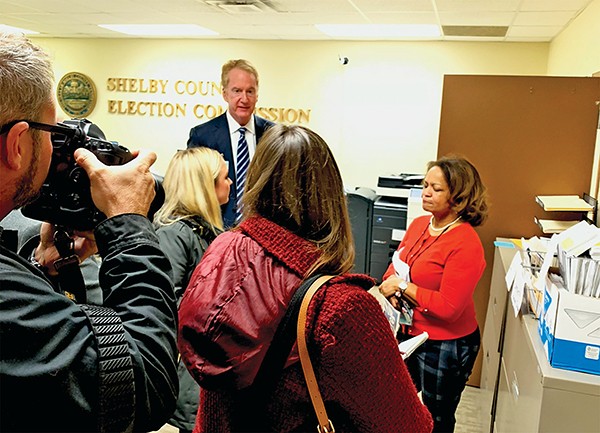 Jackson Baker
Jackson Baker
Election officials facing off with the media.
Whether by caprice or conspiracy or simple coincidence, the election ending on the official election day of November 6th will have been marked by several other instances of presumably avoidable confusion.
Examples abound: Three referenda of some importance to the future of Memphis (whose registered voters are the only ones entitled to vote on them) are worded like something translated loosely from oral sources in Uzbekistan. And in this case, suspicion is strong that the confusion is intentional.
One is a referendum on City Ordinance #5676, which would prohibit someone from election as mayor or council member “if any such person has served at any time more than three (3) consecutive four-year terms, except that service by persons elected or appointed to fill an unexpired four-year term shall not be counted as full four-year term.” All clear?
The language would seem to be imposing a three-terms limit requirement. And it does, except that it conveniently omits that a two-term-limits requirement has already been passed by voters.
To be clear to voters, the ordinance should have specified that what it does is extend the current limitation by another four-year term. Hmmm. Anyone care to guess why the incumbent council members voted unanimously in favor of such misleading language?
Moreover, another problem with the referendum as worded in the ballot was pointed out by the most lengthily-tenured of all Memphis chief executives, Willie Herenton, who served from 1991 until his retirement in 2009 and was elected five times.
At a press conference last week, Herenton and his attorney Robert Spence pointed out that the referendum language, as approved by the council, applied to electoral service “at any time after December 31, 2011” — an exemption that would allow Herenton to pursue an announced mayoral race in 2019, whereas the language on the ballot seemingly would not.
In response, Council Chair Berlin Boyd summoned up all his formidable dudgeon to pronounce allegations by Herenton of fraud and conspiracy to be “fictitious” and dismissed the ballot language as due to a “drafting error” by council attorney Allan Wade. While he and Wade spoke vaguely of there being a possible “remedy” in Herenton’s case, the ballot will continue to read as it reads.
Another referendum, to establish City Ordinance #5669, repeals an amendment approved by the voters in a 2008 referendum that allowed “instant runoff voting,” a process involving the redistribution of runner-up ballots so as to declare majority winners without runoff elections, and would “restore the election procedure existing prior to the 2008 Amendment for all City offices,” while “expressly retaining the 1991 federal ruling for persons elected to the Memphis City Council single districts.”
IRV, also known as “Ranked Choice Voting,” is slated to be employed for the first time, unless repealed, in the 2019 city election. Though county Election Administrator Linda Phillips has pronounced the method eminently viable, incumbent council members and council attorney Allan Wade have possibly gone beyond their official wherewithal to oppose it.
During the 2018 legislative session, Wade dispatched city lobbyists to Nashville to lobby for a bill that would ban IRV statewide. More recently, Boyd used his chairman’s recap email to publicly argue for passage of the anti-IRV referendum and the other two.
The 2008 referendum enabling IRV, also known as “Ranked Choice Voting,” is scheduled, unless repealed, to be employed for the 2019 city election. In 2008, the ordinance bore a required “fiscal note” estimating savings for the city of $250,000, to be gained from making costly runoff elections unnecessary.
Presumably, Ordinance #5669 should also carry a fiscal note, in this case specifying a cost to the city for restoring runoffs of at least $250,000, amended for inflation. But no sum is specified, the city finance director having claimed an inability to estimate one.
Should Ordinance #5669 pass, its clause calling for the restoration of runoff elections would clash directly with the language of the third referendum on the ballot, for Ordinance #5677, which would eliminate runoff elections altogether. Passage of both referenda would occasion legal confusion.
Some measure of confusion also could result from the fact that the ballot language asks citizens to cast their votes “for” or “against” the three referenda, whereas the language originally approved by the council and incorporated in the Election Commission’s official sample ballot seeks “yes” or “no” votes. This change, like the order of listing of candidates’ names, was apparently mandated by state Election Coordinator Goins.
All of the above by itself is sufficient to rattle the equilibrium of voters. But there’s more. Even before voting got under way, the Election Commission had to call a press conference to announce that not all of the voters’ registration applications that were completed by the official deadline had been processed and that some voters, once validated by registration records, would have to have their information channeled into the voting machines when they arrived to vote.
Some early voters reported that they were given paper ballots instead, but election officials stoutly denied that — except in the case of isolated voters arriving at the polls without verifiable credentials. These voters were given “provisional ballots” to be checked against records at the end of the vote-counting process. These ballots are paper, but identifiable by a specific color code.
On top of a mounting propaganda campaign against early voting and what many see as the vote-discouraging effects of a state photo-ID law that requires working-class voters and impoverished citizens to furnish these badges of middle-class identity at the polls, this pattern of miscues suggests that the democratic process has become something of an obstacle course.

(left to right) Phil Bredesen, Democrat; Marsha Blackburn, Republican; Karl Dean, Democrat; Bill Lee, Republican
On the Cusp of Decision
As noted above, the seeds of mystery, doubt, and confusion have been sown a-plenty in the runup to the November election, the last of several electoral showdowns this year. Not to mention enough boilerplate and talking points and attack ads to exhaust the patience and menace the stability of the voting public.
Yet there is still a sense that this concluding election of 2018 could mark a real difference, perhaps even a decisive shift, in the direction not only of local events but in the developing destinies of the state of Tennessee and of the nation at large. This is evident both in the tenor of the two major statewide races on the ballot — for governor and for U.S. senator — but also in the incidentals of local races and of the three key referenda confronting Memphis voters.
In comparison to the issues on the Memphis ballot, the contests for governor and U.S. senator would seem to be relatively simple matters. The race for governor, between Franklin businessman Bill Lee, the Republican, and former Nashville Mayor Karl Dean, the Democrat, has actually hewed fairly closely to the democratic concepts the forefathers may have had in mind. In their public statements, including those made in the course of two debates televised statewide, Lee and Dean have behaved with commendable courtesy and apparent respect toward each other, outlining their views without rancor or mystification.
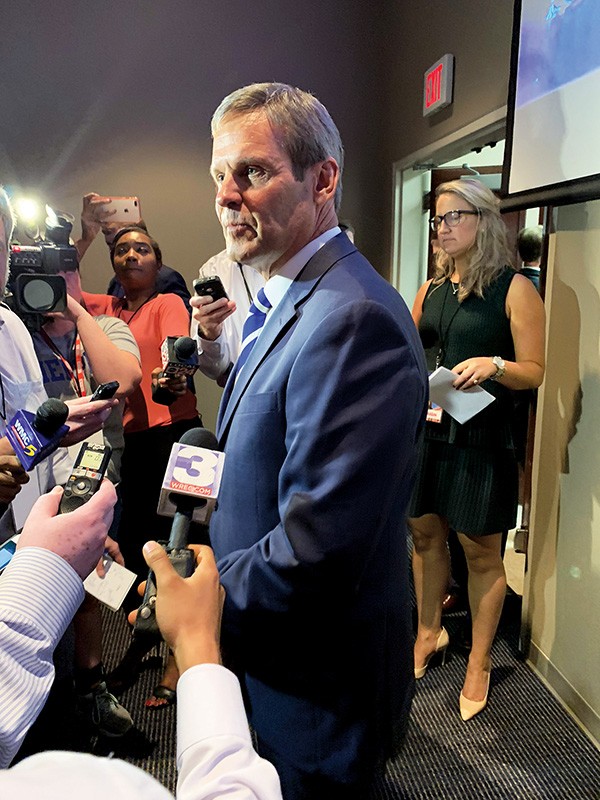 Jackson Baker
Jackson Baker
Bill Lee (above) and Karl Dean (below) behave with “commendable courtesy.”
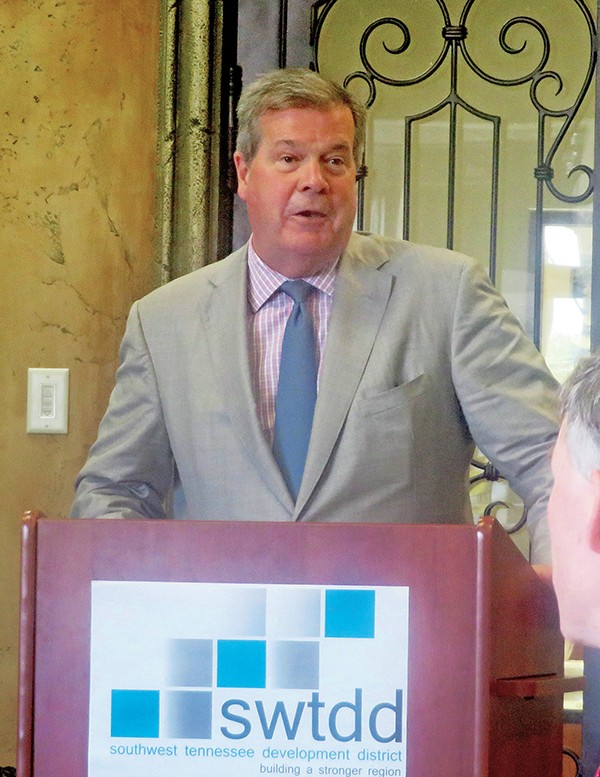
Karl Dean
Lee emphasizes his faith and allows for faith-based approaches, while, in keeping with his professed conservatism, espousing a preference for marketplace solutions. Dean, who stresses his track record as a mayor, has a greater affinity for governmental activism. The chief disagreement between the two is over the efficacy of Medicaid expansion, which Dean strongly favors, arguing that the state has been forfeiting $1 billion and a half annually in federal funds under the Affordable Care Act, money that could keep Tennessee’s struggling rural hospitals afloat. Lee counters that participation in the ACA bounty would amount to pouring such funding into a “fundamentally flawed system.”
It is generally acknowledged that Lee, a political newcomer, won his nomination by keeping free of the animosities and name-calling that early GOP gubernatorial frontrunners Diane Black and Randy Boyd hurled at each other. In like manner, Dean and his primary opponent, Democratic House Leader Craig Fitzhugh of Ripley, kept the peace with each other for the most part.
But the general election showdown for the U.S. Senate seat vacated by the GOP’s Bob Corker has been a slugfest in which former Governor Phil Bredesen, the Democrat, and 7th District Congressman Marsha Blackburn, the Republican, have thrown nonstop haymakers at each other, and in this case there is no sweet-natured Marlboro Man for grossed-out voters to turn to as an alternative. One of them — either Bredesen or Blackburn — will win in what started out as a neck-and-neck race but has shifted ever so gradually, if the polls can be trusted, in Blackburn’s direction.
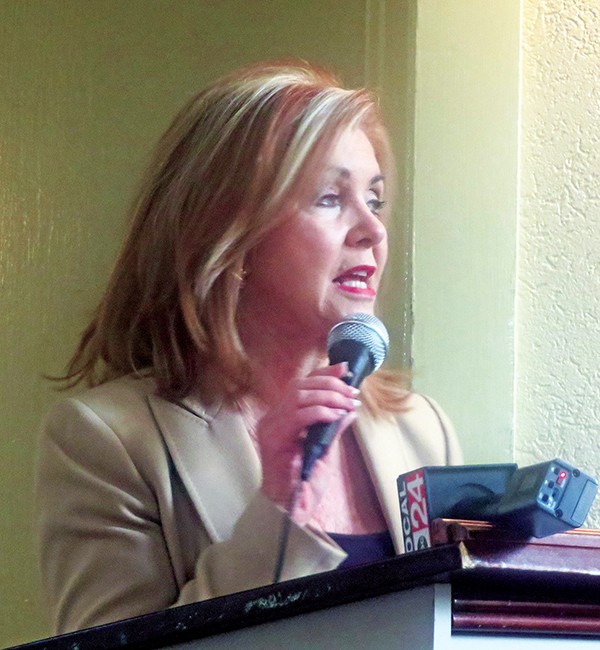 Jackson Baker
Jackson Baker
Marsh Blackburn
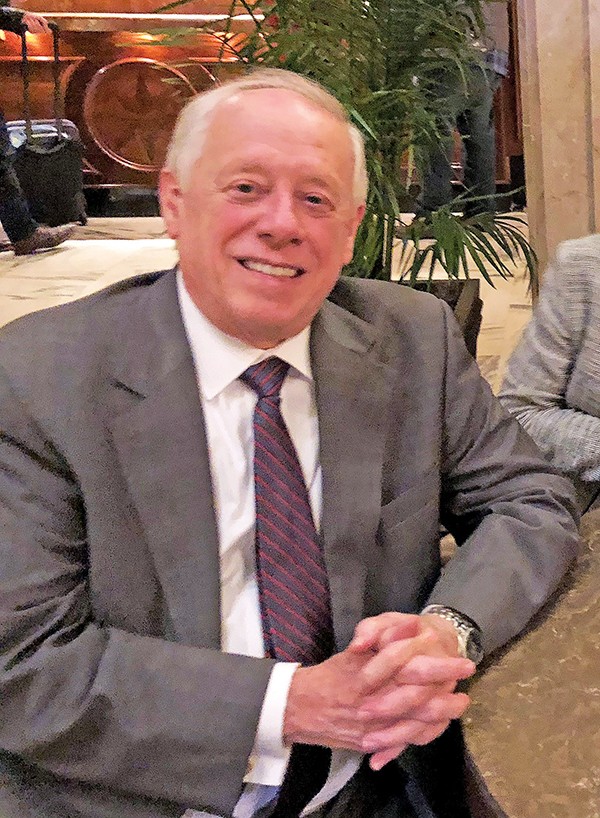 Jackson Baker
Jackson Baker
Congressman Marsha Blackburn (above); former Governor Phil Bredesen (below)
Bredesen started out well enough, running on the common-sense notion that he should represent the people of his entire constituency, working across the aisle in Congress as, demonstrably, he did as governor. It may well be that he is a Democrat because in Nashville, perhaps the last remaining outpost of the onetime solid Democratic South, conditions still favor white Democrats running for office.
A case in point that illustrates the real Bredesen: In 2001, the year before Bredesen’s election as governor, then state Senator Marsha Blackburn advocated a Draconian eight percent spending cut across the entire state budget; Bredesen came to power, instituted a nine percent cut and began to radically downsize TennCare, the state health-care program that his well-intentioned Republican predecessor Don Sundquist had tried valiantly to maintain. Even the arch-conservative Blackburn praised him at the time.
So much for the GOP’s current campaign fiction that Bredesen, a former Nashville mayor who came into politics after making a fortune as a health-care entrepreneur, would be the tool of radical tax-and-spend Democratic taskmasters in Congress. His rhetorical throwing of Democratic Senate Leader Chuck Schumer under the bus or his pubic praise of Trump Supreme Court nominee Brett Kavanaugh may have looked like craven cave-ins to Blackburn at the time, but those actions probably were true representations of Bredesen’s mind.
Such criticism as Bredesen makes of the Trump administration, and it is minimal, is directed mainly at presidential gambles that might ultimately jeopardize the business climate, like Trump’s tariff wars.
Even so, the Bredesen-Blackburn race is one of crucial importance to the political balance of power, nationally. If Bredesen’s political stance is only modestly Democratic, Blackburn’s Republicanism is Trumpian brinkmanship to the max. Largely indifferent to social safety-net measures, she is a zealous advocate of the corporate tax-cut measures favored by congressional Republicans, wants to see Trump’s Great Wall built on the nation’s southern border, and is so much a champion of the profit motive that she, perhaps unwittingly, became the sponsor of a laissez-faire initiative that 60 Minutes highlighted as having opened the door to unregulated proliferation of opioid medications.
As a synecdoche, the Bredesen-Blackburn Senate race could well be the decisive one in determining whether the Democratic blue wave that flowed so vigorously for most of the year remains strong enough to accomplish the party’s return to power in Congress and its regeneration as a national force. It is no exaggeration to say that the eyes of the nation are upon us. (Local political races are dealt with in “Politics.”)